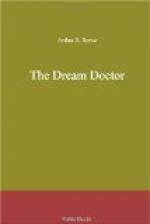Again I looked. “Yes,” I said, “but will one of us have to watch here all the time?”
He had been working on a black box in the meantime, and now he began to set it up, adjusting it to the hole in the wall which he enlarged on our side.
“No, that is my own improvement on it. You remember once we used a quick-shutter camera with an electric attachment, which moved the shutter on the contact of a person with an object in the room? Well, this camera has that quick shutter. But, in addition, I have adapted to the detectascope an invention by Professor Robert Wood, of Johns Hopkins. He has devised a fish-eye camera that ‘sees’ over a radius of one hundred and eighty degrees—not only straight in front, but over half a circle, every point in that room.
“You know the refracting power of a drop of water. Since it is a globe, it refracts the light which reaches it from all directions. If it is placed like the lens of a camera, as Dr. Wood tried it, so that one-half of it catches the light, all the light caught will be refracted through it. Fishes, too, have a wide range of vision. Some have eyes that see over half a circle. So the lens gets its name. Ordinary cameras, because of the flatness of their lenses, have a range of only a few degrees, the widest in use, I believe, taking in only ninety-six, or a little more than a quarter of a circle. So, you see, my detectascope has a range almost twice as wide as that of any other.”
Though I did not know what he expected to discover and knew that it was useless to ask, the thing seemed very interesting. Craig did not pause, however, to enlarge on the new machine, but gathered up his tools and announced that our next step would be a visit to a lawyer whom the Elmores had retained as their personal counsel to look after their interests, now that the district attorney seemed to hare cleared up the criminal end of the case.
Hollins was one of the prominent attorneys of East Point, and before the election of Kilgore as prosecutor had been his partner. Unlike Kilgore, we found him especially uncommunicative and inclined to resent our presence in the case as intruders.
The interview did not seem to me to be productive of anything. In fact, it seemed as if Craig were giving Hollins much more than he was getting.
“I shall be in town over night,” remarked Craig. “In fact, I am thinking of going over the library up at the Godwin house soon, very carefully.” He spoke casually. “There may be, you know, some finger-prints on the walls around that closet which might prove interesting.”
A quick look from Hollins was the only answer. In fact, it was seldom that he uttered more than a monosyllable as we talked over the various aspects of the case.
A half-hour later, when he had left and had gone to the hotel, I asked Kennedy suspiciously, “Why did you expose your hand to Hollins, Craig?”




